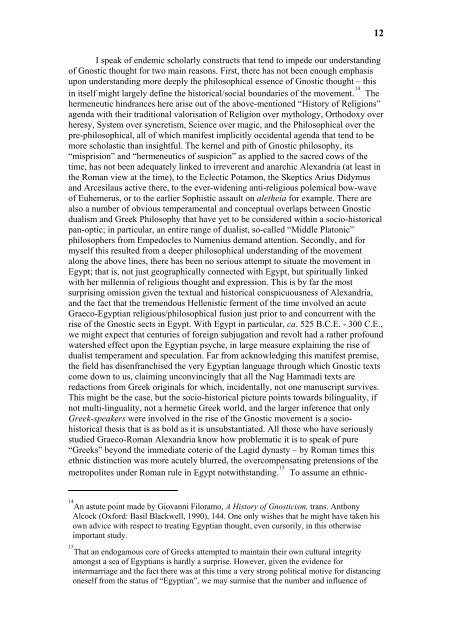THE EGYPTIAN FOUNDATIONS OF GNOSTIC THOUGHT
THE EGYPTIAN FOUNDATIONS OF GNOSTIC THOUGHT
THE EGYPTIAN FOUNDATIONS OF GNOSTIC THOUGHT
You also want an ePaper? Increase the reach of your titles
YUMPU automatically turns print PDFs into web optimized ePapers that Google loves.
I speak of endemic scholarly constructs that tend to impede our understanding<br />
of Gnostic thought for two main reasons. First, there has not been enough emphasis<br />
upon understanding more deeply the philosophical essence of Gnostic thought – this<br />
in itself might largely define the historical/social boundaries of the movement. 14<br />
The<br />
hermeneutic hindrances here arise out of the above-mentioned “History of Religions”<br />
agenda with their traditional valorisation of Religion over mythology, Orthodoxy over<br />
heresy, System over syncretism, Science over magic, and the Philosophical over the<br />
pre-philosophical, all of which manifest implicitly occidental agenda that tend to be<br />
more scholastic than insightful. The kernel and pith of Gnostic philosophy, its<br />
“misprision” and “hermeneutics of suspicion” as applied to the sacred cows of the<br />
time, has not been adequately linked to irreverent and anarchic Alexandria (at least in<br />
the Roman view at the time), to the Eclectic Potamon, the Skeptics Arius Didymus<br />
and Arcesilaus active there, to the ever-widening anti-religious polemical bow-wave<br />
of Euhemerus, or to the earlier Sophistic assault on aletheia for example. There are<br />
also a number of obvious temperamental and conceptual overlaps between Gnostic<br />
dualism and Greek Philosophy that have yet to be considered within a socio-historical<br />
pan-optic; in particular, an entire range of dualist, so-called “Middle Platonic”<br />
philosophers from Empedocles to Numenius demand attention. Secondly, and for<br />
myself this resulted from a deeper philosophical understanding of the movement<br />
along the above lines, there has been no serious attempt to situate the movement in<br />
Egypt; that is, not just geographically connected with Egypt, but spiritually linked<br />
with her millennia of religious thought and expression. This is by far the most<br />
surprising omission given the textual and historical conspicuousness of Alexandria,<br />
and the fact that the tremendous Hellenistic ferment of the time involved an acute<br />
Graeco-Egyptian religious/philosophical fusion just prior to and concurrent with the<br />
rise of the Gnostic sects in Egypt. With Egypt in particular, ca. 525 B.C.E. - 300 C.E.,<br />
we might expect that centuries of foreign subjugation and revolt had a rather profound<br />
watershed effect upon the Egyptian psyche, in large measure explaining the rise of<br />
dualist temperament and speculation. Far from acknowledging this manifest premise,<br />
the field has disenfranchised the very Egyptian language through which Gnostic texts<br />
come down to us, claiming unconvincingly that all the Nag Hammadi texts are<br />
redactions from Greek originals for which, incidentally, not one manuscript survives.<br />
This might be the case, but the socio-historical picture points towards bilinguality, if<br />
not multi-linguality, not a hermetic Greek world, and the larger inference that only<br />
Greek-speakers were involved in the rise of the Gnostic movement is a sociohistorical<br />
thesis that is as bold as it is unsubstantiated. All those who have seriously<br />
studied Graeco-Roman Alexandria know how problematic it is to speak of pure<br />
“Greeks” beyond the immediate coterie of the Lagid dynasty – by Roman times this<br />
ethnic distinction was more acutely blurred, the overcompensating pretensions of the<br />
metropolites under Roman rule in Egypt notwithstanding. 15<br />
To assume an ethnic-<br />
14<br />
An astute point made by Giovanni Filoramo, A History of Gnosticism, trans. Anthony<br />
Alcock (Oxford: Basil Blackwell, 1990), 144. One only wishes that he might have taken his<br />
own advice with respect to treating Egyptian thought, even cursorily, in this otherwise<br />
important study.<br />
15<br />
That an endogamous core of Greeks attempted to maintain their own cultural integrity<br />
amongst a sea of Egyptians is hardly a surprise. However, given the evidence for<br />
intermarriage and the fact there was at this time a very strong political motive for distancing<br />
oneself from the status of “Egyptian”, we may surmise that the number and influence of<br />
12










